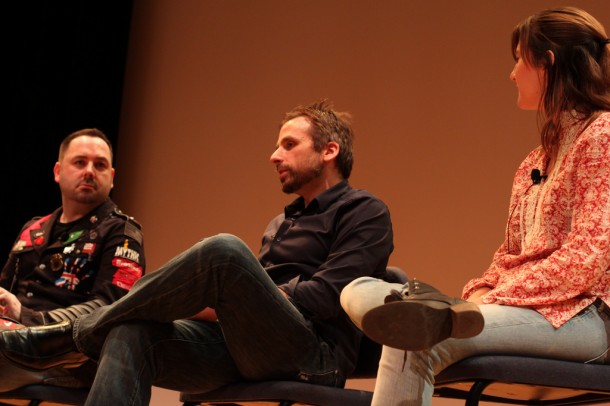 The Smithsonian’s month-long exhibit on video games, titled “The Art of Video Games”, began Friday, March 16. To kick it off they invited various industry luminaries, from pioneers like Keith Robinson (Intellivision), to modern legends like Ken Levine (System Shock 2, BioShock), to talk in a series of panels about the past, present, and future of games.
The Smithsonian’s month-long exhibit on video games, titled “The Art of Video Games”, began Friday, March 16. To kick it off they invited various industry luminaries, from pioneers like Keith Robinson (Intellivision), to modern legends like Ken Levine (System Shock 2, BioShock), to talk in a series of panels about the past, present, and future of games.
Paul Barnett, Creative Director at Mythic Entertainment, Mark DeLoura, a gaming technology specialist, Levine, Creative Director at Irrational Games, Kellee Santiago, President of Thatgamecompany, and exhibit curator Chris Melissinos sat down to discuss the evolution of games and where they are heading.
Starting things off, Melissinos asked Santiago the goal of making a game like Flow. Santiago reduces it to a Snake clone, something of a remix of an old idea she said. The point of it was to have “access to everyone,” to get away from the barriers to entry for those that aren’t familiar with the medium. The technology is so advanced, we’re allowed to focus on the what would have seemed less important 10 years ago. Experiences like Flow explore emotion much more than graphical prowess.
 Levine wants to tell a story and explore a world with his projects, but to remain fictional while exploring the human condition. Part of his love for the first-person genre comes from the ability to have a personal narrative with the player. When asked about choice in BioShock, he couldn’t help from giving some praise to BioWare’s strength in choice with Barnett sitting just to his right. “BioShock was rather simple,” he said. Originally, in place of the little sisters, were sea slugs, but Levine said they were “terrible because you have no empathy [with them].” To convey the correct emotion, they went with the girls, and the outcome became an unforgettable component of that experience.
Levine wants to tell a story and explore a world with his projects, but to remain fictional while exploring the human condition. Part of his love for the first-person genre comes from the ability to have a personal narrative with the player. When asked about choice in BioShock, he couldn’t help from giving some praise to BioWare’s strength in choice with Barnett sitting just to his right. “BioShock was rather simple,” he said. Originally, in place of the little sisters, were sea slugs, but Levine said they were “terrible because you have no empathy [with them].” To convey the correct emotion, they went with the girls, and the outcome became an unforgettable component of that experience.
He can’t talk about his current project, but Barnett brought up what he calls a personal “golden age” of gaming. Everyone has one. It’s that moment in your life where your understanding of games clicks, and you begin to appreciate them going forward. I think mine happened after finishing Kingdom Hearts 2. “That period defines my understanding of games,” he said. “It’s not their fault their first game was Final Fantasy XI,” the first game that strikes you will never cease to be your favorite.
“The golden age is what you get access to. The games are available, but I never got to see them, so I don’t care. I played the ones that I could get a hold of.”
“Everything from the future is going to come from the past.” The generations of children growing up with games now will drive the future. As games develop a wider audience, everyone begins to have their own golden age of gaming, and their future projects will reflect it.
“What’s weird about my golden age is I have to understand that everyone else’s is legitimate.”
 He brought up his 13-year-old son, and the games he has available to him now, and what will eventually be his golden age. “The current golden age is pretty, bloody good.”
He brought up his 13-year-old son, and the games he has available to him now, and what will eventually be his golden age. “The current golden age is pretty, bloody good.”
“Falling into the golden age, I think it’s a trap,” DeLoura retorted. “The games that break my mentality of what a game should be, those are the games I really get excited about.”
With an expertise in video game technology, he sees the future of games depending on the lowering barriers to entry for developers. Only then, can the ideas that will grow the medium truly do their work. Specifically, the ideas from wildly different cultures and communities of people that we have yet to see.
Santiago also disagreed with Barnett’s golden age theory. “There nothing in the design perspective that wasn’t capable then, in 2D, that somehow magically we have now,” she explained. With easier access to 2D game development and therefore an easy route to return to older game design, it makes the golden age less special.
“I don’t know where games are going to be tomorrow,” Levine said. The most important thing for game developers is to be open to change. Just “roll with it.” He mentioned the recent fascination with Kickstarter as an important step toward changing the development model “I don’t know if it’s going to exist in the current form that is in right now, or if it is going to evolve into something else, but this notion of democratized patronage is incredibly powerful.”
Barnett went on to examine the term “gamer” and how much it’s grown to classify nearly everyone with the advent of mobile and Facebook gaming. Levine agreed, he doesn’t understand those who call out popular games as non-games. “I think games should be whatever floats everybody’s boat.”
 The discussion got a lot more controversial once DeLoura brought up the animal rights activist clone of Grand Theft Auto, Steer Madness, and a game about shooting U.S. soldiers in Iraq. To him, every game, regardless of if you agree with it or not, is simply a means for a creator to get his point across to a wider audience.
The discussion got a lot more controversial once DeLoura brought up the animal rights activist clone of Grand Theft Auto, Steer Madness, and a game about shooting U.S. soldiers in Iraq. To him, every game, regardless of if you agree with it or not, is simply a means for a creator to get his point across to a wider audience.
Host Melissinos describes gameplay as a way to discover new things about our world. For a long time, gaming was dismissed, even shunned, but now children are growing up surrounded by it. He said the next 10 years of games that come from them is going to be “staggering.”
Strictly looking forward, Santiago hopes to see the people making games to “completely change,” and to be “telling their own stories.” Levine wants to see the requirements to make games continue to disappear to open up for even more creativity. Barnett is amazed by education’s adoption of games and sees it as vital to making ones that are firstly “awesome”, so that we can look back on them as art. Melissinos reiterated his notion, adding that artists do not decide what of their own work is art, “we can’t predict that. Where art’s going to come from is anywhere.”
The entire panel, including the Q&A session, can be viewed here.



No Comments